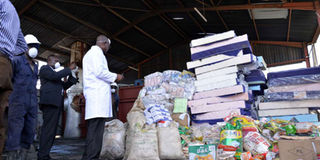Kebs issues fake food, building materials alert

Kenya Bureau of Standards (KEBS) at Athi River EPZA grounds during an intensified fight on substandard goods in the county. FILE PHOTO | NMG
What you need to know:
- The Kenya Bureau of Standards managing director said Kenya is ranked among the largest markets and distribution point for forged products in East Africa.
- The products standardisation body has in the last two years targeted food products traded by Chinese supermarkets due to non-compliance in marketing.
- Kebs has acquired additional kits to enhance testing and calibration capacity for Genetically Modified Organisms (GMOS) and upgrade its imports standard mark to secured format.
When shopping for food products and construction materials, be on the lookout as there are many counterfeits in the market, a watchdog has warned.
The Kenya Bureau of Standards (Kebs) managing director Charles Ongwae, said Kenya is ranked among the largest markets and distribution point for forged products in East Africa.
He, however, said measures have been put in place to save the country loss of billions of shillings from the scam.
“Our market surveillance services indicate that some imported products do not conform to relevant regulations with respect to health, safety and environmental requirements,” said Mr Ongwae.
He was speaking in Nakuru on Friday during a media workshop.
The products standardisation body has in the last two years targeted food products traded by Chinese supermarkets due to non-compliance in marketing.
“Kebs now requires all imported products to be marked with a secure Import Standardisation Mark. This helps trace genuinely imported goods into the country. Consumers are able to know the importer and product description,” said Mr Ongwae.
He said Kebs last year impounded 220 kilogrammes of substandard rice and seized 770 kilogrammes of inferior sugar in the fight against counterfeit products into the country.
The country was in January on high alert after it was reported that unscrupulous businessmen had sneaked in a shipment of plastic rice. The effects of consuming such fake rice include cancers.
Regional laboratories
“Products that do not meet safety and quality requirements are stopped at the source to protect public health and environmental safety by ensuring that the country is not a dumping ground for hazardous goods and obsolete equipment,” said Mr Ongwae.
He said the steel industry has been stopped from manufacturing and use of twisted reinforcement steel bars after the country adopted the ribbed bars as part of safeguard measures for the sector.
“An estimated 26,550 pieces of steel reinforcement bars have been seized since last year in Eldoret and Nairobi due to major non-confirmative and additional 72,462 pieces of roofing material seized in Kisii, Meru, Embu and Mombasa with major non-compliance in mass zinc/aluminum-zinc coating,” said Mr Ogwae.
To strengthen its regional testing laboratories to ensure that local and imported products comply with the required standards, Kebs has constructed new facilities for the Coast region (Mombasa), Lake region (Kisumu) and North Rift region (Eldoret).
It has also expanded its testing facilities to include radiation techniques such as radio-chemistry and radiography.
“Animal feed manufacturers are being closely monitored for compliance. Both the code of practice for this sector as well as the product standards are mandatory compliance criteria,” said Mr Ongwae.
He said Kebs has acquired additional kits to enhance testing and calibration capacity for Genetically Modified Organisms (GMOS) and upgrade its imports standard mark to secured format.
“We have established Standards Market Access Program which is an European Union scheme aimed at enhancing market access and competitiveness of Kenyan products through improved food safety standardization, regulation and enforcement,” said Mr Ongwae.
At the regional market level, Kebs was promoting East African Community one stop border post concept aimed at harmonizing transit clearance, where officers from bordering countries sit under one roof to handle transit documents concurrently.




